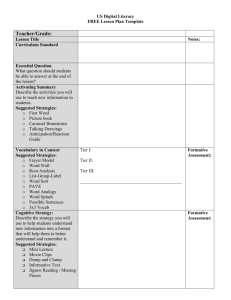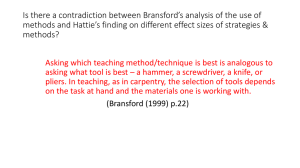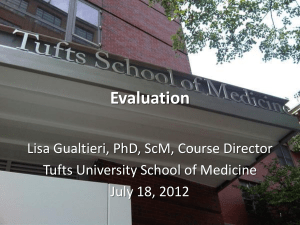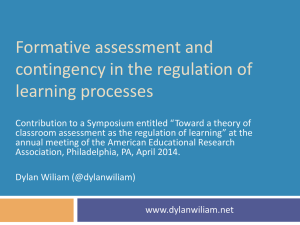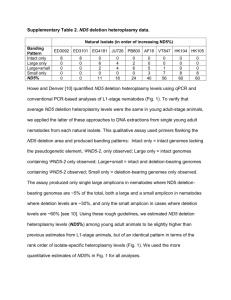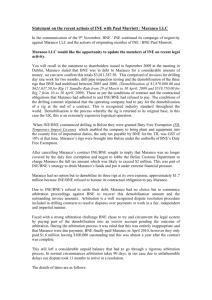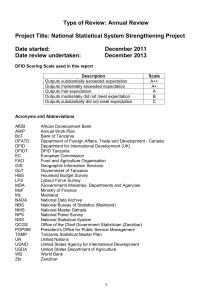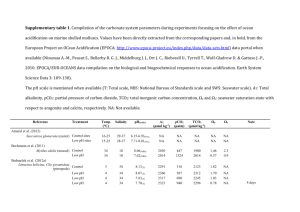6th Academic Practice Study Day & Conference An annual event
advertisement
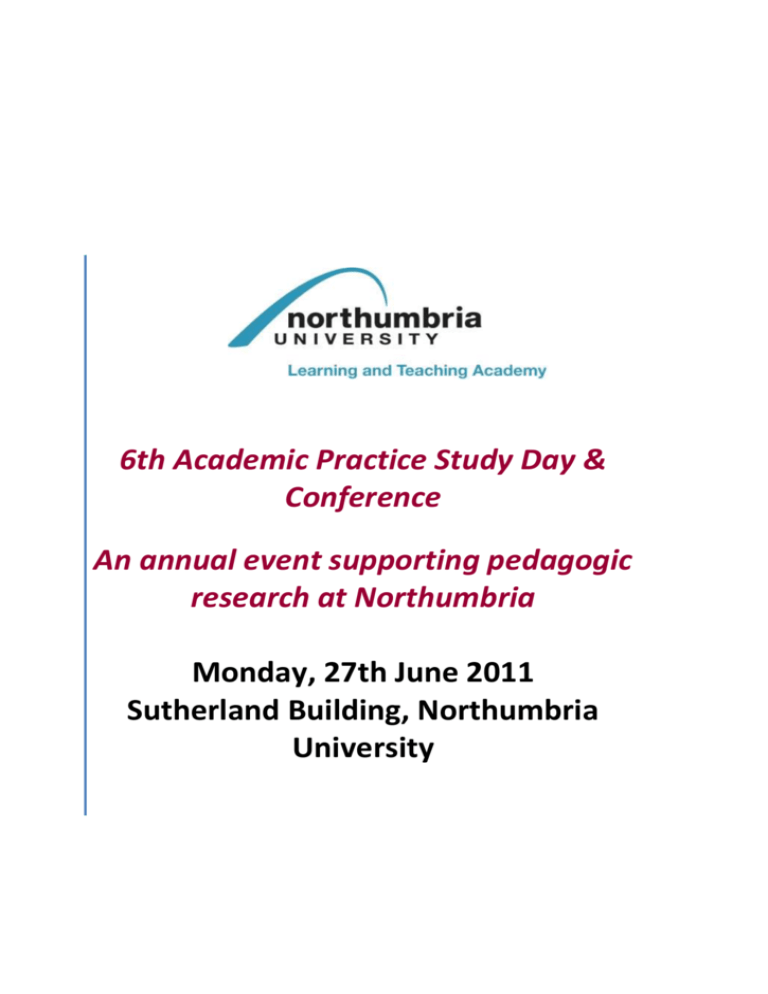
6th Academic Practice Study Day & Conference An annual event supporting pedagogic research at Northumbria Monday, 27th June 2011 Sutherland Building, Northumbria University 6th Academic Practice Study Day & Conference An annual event supporting pedagogic research at Northumbria Monday, 27th June 2011 Sutherland Building, Northumbria University Programme 8.45 Registration & Refreshments 9.15 9.30 Welcome, introduction to the day Papers 1 & 2 Sue Bloxham, University of Cumbria: Supporting student achievement: the mismatch between guidance and marking. Mark Huxham, Edinburgh Napier University: Experiments in Education: how quantitative approaches can help us understand our teaching Discussion of papers 1 & 2 in smaller groups over coffee/tea (you will be allocated to a group, list in conference pack) Plenary discussion of papers 1 & 2 with speakers Participants’ round tables 11.45- 12.25 Parallel round tables, slot 1 The difficulties in teaching engineering ethics to engineering students Reaz Hassan, CEIS (Room 201) Work-based Project and Masters in Academic Practice - Kevin Elliott, BNE (Room 205) Virtual Peer Mentoring - Dealing with a neutral outcome - Joanne Smailes, NBS (Room 206) Bridging the Distance Gap - The Human Voice as an Interface - Claire Hoy, NBS (Room 209) 12.30 – 13.10 Parallel round tables, slot 2 The challenges posed by group teaching and assessment on a distance learning law programme - Claire Bessant, Law (Room 201) Does formative feedback and formative assessment really work for international students to inform their future approaches to learning Martin Foo, NBS (Room 205) PODcasts – ‘Learning outside of the Lecture Space - David Morton, BNE (Room 206) Academic Advising - Do we need to think about sustained support for students? - Fiza Rashid-Doubell, LS (Room 209) 10.30 11.15 11.45 Sutherland Building Foyer Great Hall Great Hall Rooms 201, 205, 209 Great Hall Rooms 201, 205, 206, 209 Page | 1 13.15 14.00 15.00 15.45 16.15 17.15 17.30 Lunch Poster viewing Book stall from the Well Read Bookshop Paper 3 & 4 Ann-Marie Bathmaker, University of the West of England: Complexity, uncertainty and confusion: applying for HE in a changing field of higher education Gwyneth Hughes, Institute of Education: The 'inbetweeners': exploring contradictions experienced by taught postgraduates Discussion of papers 3 & 4 in smaller groups over coffee/tea (you will be allocated to a group, list in conference pack) Plenary discussion of papers 3 & 4 with speakers In a nutshell - information skills and resources for pedagogic research 16.15 Jamie Harding: SPSS for quantitative data analysis 16.30 Jane Wilcockson: NVivo for qualitative data analysis 16.45 Suzie Kitchin: Effective searching for literature 17.00 Michelle Walker: Using Endnote for referencing Rounding up Questions & Answers about information skills and resources More poster viewing and bookshop stall Drinks and nibbles Close Great Hall Great Hall Rooms 201, 205, 209 Great Hall Great Hall Great Hall Page | 2 Plenary Speaker Abstracts Sue Bloxham, University of Cumbria Supporting student achievement: the mismatch between guidance and marking. This paper draws on personal research over a decade to explore the issue of helping diverse students succeed in their University assessment. I shall do this in a rather back to front way by starting with what tutors are doing as they mark, how they are making their judgements and what they are looking for. The reason I am taking this approach is because my recent research career has actually gone in the opposite direction. As I have worked with colleagues on a range of practitioner research projects designed to help, so called, ‘widening participation’ students to succeed in higher education, I have become more and more interested in what ‘succeeding’ is all about, and that has led me, not surprisingly, to investigating tutors’ marking practices. What has struck me most perhaps, is that students understand the importance of focusing on staff marking; they have told us how important it is to talk to tutors, to find out what they really want, to hear it from the horse’s mouth so to speak, rather than rely on the formal guidance that we may give them. The paper will draw on a range of studies both of the student perspective and staff marking to explore the disjunction between guidance and judgement and will conclude with some suggestions for achieving greater alignment. Sue Bloxham is Professor of Academic Practice at the University of Cumbria. She has taught in higher education for many years, developing a particular interest in action research related to assessment, active learning and widening participation. Sue published the best selling Developing Effective Assessment in Higher Education: A practical Guide (Open University Press) with her Cumbria Colleague, Pete Boyd, in 2007; the same year that she was awarded a National Teaching Fellowship. Sue’s interest in assessment focuses particularly on how we manage our higher education assignments and examinations to support the achievement of students from under-represented groups. She has also researched and published on matters such as student skills development, group assessment, feedback, course design and marking. Mark Huxham, Edinburgh Napier University Experiments in Education: how quantitative approaches can help us understand our teaching Pedagogical research in Higher Education is dominated by qualitative and small-scale studies. Controlled experiments are rare, despite their status as ‘gold standard’ methodology in medicine and other fields. The reasons for this are complex and interesting. They include strong arguments in favour of qualitative approaches and of ‘critical pedagogy’ that eschews experimental designs. In this talk I will argue that despite these objections experiments should have an important place in our methodological toolkit. In particular I will address four common criticisms – ethics, crudity, insensitivity and territorial arrogance – Page | 3 and illustrate how they need not apply to experimental studies. By considering a slice through the ‘ontological onion’ of HE pedagogy I will suggest that we can identify areas of research where experimental approaches should be expanded and others where they are likely to be less useful. Mark Huxham is a Professor in Environmental Biology and Senior Teaching Fellow at Edinburgh Napier University and believes in combining teaching and research for the benefit of both. In addition to the research reported in his paper, he has investigated how effective interactive sessions are in stimulating learning, the strengths and weaknesses of alternative methods of evaluation and ways of providing rapid feedback to students. His teaching interests include first-year student support and retention; support for new, part-time and postgraduate colleagues; collaborative research on teaching; and peer observation and 'academic exchange'. He is module leader for a module aimed at postgraduates who teach at Edinburgh Napier. In 2009 he was awarded the Higher Education Academy Ed Wood prize for teaching. Mark's subject research focuses on inter-tidal ecology, and he heads a research project on mangrove restoration in Kenya. Ann-Marie Bathmaker, University of the West of England Complexity, uncertainty and confusion: applying for HE in a changing field of higher education The taken-for-granted common sense understanding of what it means to participate in higher education is ‘going to uni’ to study full-time for a Bachelor degree. A major focus of policy interest in higher education transitions is therefore on who gains access to university, and who gains access to which university. However, this dominant image of undergraduate higher education does not reflect the diversity of HE provision that has evolved since the 1960s in many countries in Europe and beyond, including England. Although less visible in the media and public perceptions, a considerable amount of HE takes place in ‘nonuniversity’ institutions, including ‘dual sector’ further and higher education institutions, and provision includes ‘short cycle’ sub-Bachelor qualifications, such as the English Foundation degree, as well as the traditional Bachelor degree. Under New Labour (1997-2010), the intention was to use these diverse forms of higher education to meet goals of increasing and widening participation. This presentation, and the paper on which it is based, explores how students following ‘alternative’, mainly vocational routes engage with the opportunity to participate in higher education. The paper uses data from an ESRC project which researched evolving provision of HE in the context of FE/HE institutions in England (the FurtherHigher Project), and focuses on the experience of applying for HE study amongst students studying in these institutions. Evans’ (2007) concept of ‘bounded agency’ is used to explore the interaction of structural factors and individual agency in the process of applying for HE. The data presented in the paper reveal the complexities and uncertainties associated with transitions to higher education amongst students who do not follow ‘standard’ academic routes to Bachelor degree study. The analysis suggests that structural factors play an important role in positioning students in relation to HE, but so too do students’ dispositions Page | 4 and orientations to HE. Evans’ concept of ‘bounded agency’ provides a means of understanding how an interaction of structural factors, dispositions and orientations to HE linked to the habitus and to individual agency, shapes the experience of applying for higher education amongst students in the study. The paper concludes by discussing the implications of ‘bounded agency’ for transitions to HE in the context of diverse, mass higher education. In addition to discussing data and findings from the study, this presentation will consider how I came to use the concept of ‘bounded agency’. Here I discuss the process of identifying and then applying a theoretical lens or resource, and how the use of a particular theoretical lens may help to analyse and understand empirical data. Ann-Marie Bathmaker is Professor of Further Education and Lifelong Learning at the University of the West of England, Bristol. Her research focuses on vocational and postcompulsory education, and new forms of higher education. She is particularly interested in constructions of teaching and learning in changing policy and socio-economic contexts, and the implications for social justice, equity and human agency. Her recent research includes an ESRC-funded study of widening participation in new forms of higher education (the FurtherHigher Project), an evaluation of Work-Related Learning in English schools, and a longitudinal project exploring the construction of professional identities in English further education. She is currently working on a Leverhulme-funded project which investigates working class and middle class participation in higher education at the two universities of Bristol in the UK (the Paired Peers project), and a study of the construction of knowledge in English General Vocational Education. Gwyneth Hughes, Institute of Education The 'inbetweeners': exploring contradictions experienced by taught postgraduates Taught postgraduates are little studied but the transitional position of such programmes between undergraduate and doctoral study calls for a greater understanding of the experiences of this group of mature and often part-time students. The literature on part-time students suggests that these learners are highly motivated but face constraints because of managing busy lives alongside study. However, little attention has been given to the academic transition that these learners undertake. Using a theoretical framework which draws on concepts of communities of practice and of learning careers, this paper presents findings from a longitudinal intensive study of 15 Masters students. Work intensification was managed well by these motivated learners, but they were presented with contradictions between autonomy and relying on tutor expertise and between bureaucracy and respect. Successful negotiation of these contradictions enabled participation in disciplinary communities of practice as well as full membership of peer learning communities. Younger students were less able to manage these contradictions than the more established professionals and the role of assessment was of particular significance for students with previous negative experiences of learning. The paper concludes that the contradictions could be openly discussed with students and introducing ipsative feedback might be helpful. Page | 5 Gwyneth Hughes is Senior Lecturer in Higher Education and Faculty Director Learning and Teaching in the Faculty of Policy and Society at the Institute of Education, London. She has a wide range of research interests which include learning technologies/e-learning and ipsative assessment. The research reported in this paper derives from a collaborative research project funded by the Higher Education Academy which investigates transitions to and during Master’s degree courses in the UK, with the aim to examine how improvements in formative assessment and feedback can facilitate these transitions. Page | 6 Round Tables 11.45- 12.25 Parallel round tables, slot 1 Title The difficulties in teaching engineering ethics to engineering students Presenter Reaz Hassan, CEIS Work-based Project and Masters in Academic Practice Kevin Elliott, BNE Virtual Peer Mentoring Dealing with a neutral outcome Joanne Smailes, NBS Bridging the Distance Gap - The Human Voice as an Interface Claire Hoy, NBS Short Description I have been delivering engineering ethics to Mechanical Engineering students for the past five years. The whole experience had been very challenging but rewarding. I would like to share my journey with the development of the curriculum content, assessment and feedback mechanism. I am now planning to investigate the perception of ex-graduates and final year students returning from placement about the importance and relevance of engineering ethics. I would be seeking your opinions about my plan for conducting interview and questionnaire survey. Presentation and discussion of my work-based project which focuses on researching available construction textbooks and tries to identify what makes for a good textbook, with a view to seeking advice from round table participants for ways in which this may be progressed. Is there mileage in conducting such a meta analysis? How would others go about collecting and analysing the data required? The explosion of mobile technology use within the general population means today’s students are often referred to as Digital Natives or the Net Generation (Oblinger and Oblinger, 2005; Prensky, 2001,). Baston (2008) notes that our educational systems are not yet fully recognising the changes which have arisen from this generation. As part of a pilot study in Newcastle Business School, the social networking package Facebook has been used as a support mechanism with students. Questionnaire results received illustrate some neutrality towards this initiative. This round table will be used to discuss ideas in the way this can be disseminated effectively and avoid jeopardizing the potential for this initiative to be adopted as main stream practice. A discussion to gain ideas and perspectives on developing a systematic research approach to evaluating the impact of podcasts as a means to 1. Encourage greater engagement of distance learning students. 2. Promote deeper learning. 3. Improve understanding of assessment requirements Room 201 205 206 209 Page | 7 12.30 – 13.10 Parallel round tables, slot 2 Title The challenges posed by group teaching and assessment on a distance learning law programme Does formative feedback and formative assessment really work for international students to inform their future approaches to learning? PODcasts – ‘Learning outside of the Lecture Space Presenter Claire Bessant, Law Short Description Discussion of the proposed benefits of group assessment, the challenges encountered in practice when students are distance learners Room 201 Martin Foo, NBS Montgomery & McDowell (2010) make use of active and authentic tasks to engage international students in learning and use formative assessment to try out their learning before summative assessments. Bennet (2011) questions whether there is actually any agreement amongst educators as to what constitutes “formative assessment”. So where are we with our understanding of assessment? and how can we use this to the benefit of our international students. 205 David Morton, BNE 206 Academic Advising - Do we need to think about sustained support for students? Fiza RashidDoubell, LS Presentation of podcasting developments undertaken in own practice (tutor developed podcasts and active lectures including Smartboards, voting handsets and note-taking in pebblepad) in order to obtain participants’ views on ways in which they can be evaluated and researched Discuss the concept and remit of academic advising and to meet others who are working or interested in developing research in this field. 209 Page | 8 Posters All posters will be available at 13.15 – 14.00 and again at 17.15-17.30 Title Blending and patchwork: an approach to learning, teaching and assessment for mentor preparation Presenter Kathryn Steele, Jen Logan, HCES Learning outside of the lecture space – PODcasting David Morton, BNE Podcasting in Pitlochry Cath White, BNE The evaluation of a new module assessment for postgraduate students; moving from the traditional essay to the production of a conference Evaluating an elective placement Lesley Geddes, HCES Piloting concept mapping as an alternative research tool to investigate understanding Jill Gilthorpe, HCES Nicola Reimann, HR Short Description We propose to explore two key educational concepts that have informed the development of learning, teaching and assessment strategies in a short programme for mentor preparation. The use of blended learning and patchwork text aimed to encourage students to explore their own experiences within a community of learning and practice. Early evaluation has indicated the need for further exploration of these key concepts and their application to practice; and we are keen to obtain feedback on ways in which to develop such research. To create a learning platform on which to promote inquiry based learning to support lectures and seminars. By using currently available technologies to connect the classroom to what is learnt in students’ own independent inquiry based learning. A research project investigating podcasting as a way of engaging with place for first year B.A and B.Sc. students on a first year geography fieldtrip An evaluation of a new form of assessment introduced on a postgraduate poster is discussed. The evaluation used mixed methods including involvement of students in a focus group. Findings of the evaluation will be discussed. In this poster I am proposing ideas for the evaluation of an elective physiotherapy placement and would appreciate discussion of and feedback for my ideas. I am in the process of developing a collaborative research project which aims to investigate the way in which HE staff understand assessment. I have become increasingly sceptical of using interviews as the only means to investigate conceptual understanding and would therefore like to experiment with ‘concept mapping’. However, this results in the dilemma of needing to learn how to use concept mapping as a tool, while trying to gather useful and useable data at the same time. PLUS: Well Read bookshop Opportunity to browse, buy and order books relevant to pedagogic research Page | 9 In a Nutshell: Resources for Pedagogic Research 16.15: Jamie Harding, SASS: Using SPSS for quantitative data analysis This session will introduce SPSS, a software package which is used by many quantitative researchers to explore, analyse and display statistical data. Jamie’s own pedagogic research will be used as an example to provide a very brief overview of what SPSS can do, which include statistical tests and the production of graphs, charts and tables. 16.30: Jane Wilcockson, HCES and Independent Trainer in NVivo: Using NVivo for qualitative data analysis NVivo is a powerful software for storing and managing a wide range of qualitative data, for example documents, PDFs, spreadsheets, audio, video and pictures. The range of tools within NVivo provide the opportunity for the researcher to explore the data, pursue connections, to reflect and add their own insights and ideas. This session will provide a very brief introduction to the potentials of the software. 16.45: Suzie Kitchin, Library: Effective searching for education literature Struggling to find pedagogic research and theory? Learn key searching techniques and see top education databases highlighted. 17.00: Michelle Walker, Library: Using Endnote for referencing Are your references on paper or stored in Word? Spend too much time formatting references for journals? Struggling to manage your references for different pieces of work? Endnote, the reference management tool, can help with all of these issues. See Endnote’s key features demonstrated and gain an overview of how it can help you. Page | 10
